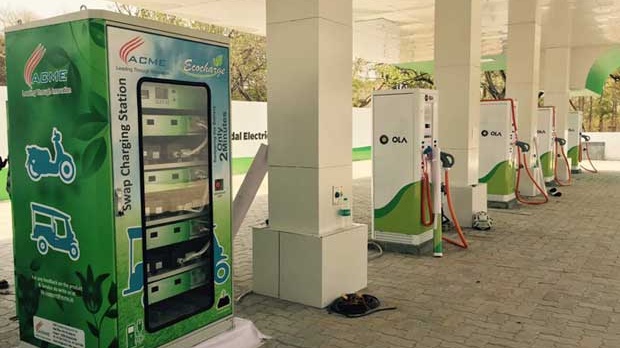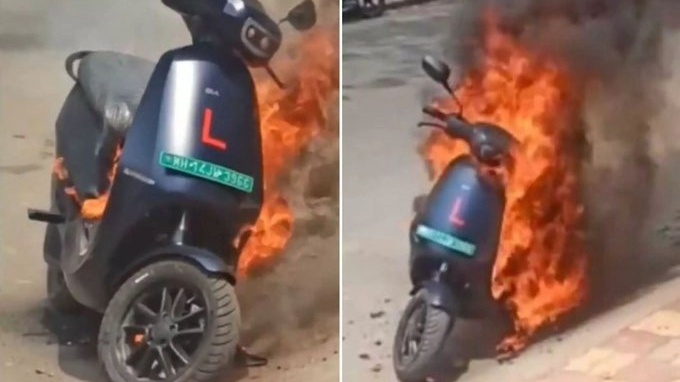Niti Aayog releases draft battery swapping policy for EVs: What's in it?
Seeks stakeholder comments

Finance Minister Nirmala Sitharaman had announced in her Budget speech that "considering space constraints in urban areas in terms of setting up charging stations, a battery swapping policy (for EVs) will be rolled out soon and interoperability standards will be formulated.
Following which the India's governmental policy think-tank NITI Aayog held an inter-ministerial discussion to formulate a robust and comprehensive Battery Swapping policy framework. NITI Aayog also held an extensive pre-draft stakeholder discussion with a wide spectrum of stakeholders representing battery swapping operators, battery manufacturers, vehicle OEMs, financial institutions, CSOs, and other experts.
After due deliberations and taking cognisance of all the inputs provided by relevant stakeholders, NITI Aayog has now come up with a draft Battery Swapping Policy. It has asked all the stakeholders to submit their comments before June 5, 2022.
The government is hoping to mainstream electric mobility by providing for battery swapping policy, special mobility zones for EVs, augmenting charging infrastructure, ratifying building by-laws, cleantech in public transport and much more. The government’s push for electric vehicles also fits into the larger scheme of combating carbon emissions.
What the draft policy says

The policy is targeted at supporting the adoption of battery-swapping, primarily for systems used in electric scooters and three-wheeler electric rickshaws.
Battery swapping, by the way, is simply replacing a depleted battery with a fully charged one at a battery swapping station, which are similar to 'petrol bunks'. This technology is set to transform the EV space as it reduces infrastructure cost and is a more efficient charging arrangement for vehicles ‘on the go’.
Among other things, the draft battery swapping policy says all metropolitan cities with a population above 40 lakh will be prioritised for development of battery swapping network under the first phase.
Get daily insight, inspiration and deals in your inbox
Sign up for breaking news, reviews, opinion, top tech deals, and more.
Cities with population above 5 lakh will be covered under the second phase, given the importance of the two-wheeler and three-wheeler vehicle segments in growing cities.
According to the draft policy, vehicles with swappable batteries will be sold without a battery, providing the benefit of lower purchase costs to potential EV owners.
It said any individual or entity is free to set up a battery swapping station at any location, provided that the specified technical, safety and performance standards are adhered to.
Battery swapping policy and EV safety

The draft policy also has something for the safety of EV batteries, something which is the need of the hour, considering the many troubling incidents reported.
The draft policy suggests the adoption of a rigorous testing protocol to ensure a high level of protection and also to avoid any unwanted temperature rise at the electrical interface. The battery management system, which is a software that controls battery functions, will have to be self-certified and open for testing to check its compatibility with various systems, and capability to meet safety requirements, it added.
The policy also proposes to assign a unique identification number (UIN) to swappable batteries at the manufacturing stage to help track and monitor them. Further, a UIN number will be assigned to each battery swapping station. It also proposes to install battery swapping stations at several locations like retail fuel outlets, public parking areas, malls, kirana shops and general stores etc.
Niti Aayog said battery swapping will fall under the battery-as-a-service (BaaS) business model, and such models would have to ensure interoperability between EVs and batteries for a successful mainstreaming of battery swapping as an alternative.
Aside from battery swapping policy, Niti Aayog has also given a proposal to bring institutional lending to purchase electric vehicles under the priority sector ambit. Simply put, this means banks loans for buying electric vehicles could become cheaper. As of now, the loans are extended under auto retail category --- among the high interest categories in India.

Over three decades as a journalist covering current affairs, politics, sports and now technology. Former Editor of News Today, writer of humour columns across publications and a hardcore cricket and cinema enthusiast. He writes about technology trends and suggest movies and shows to watch on OTT platforms.